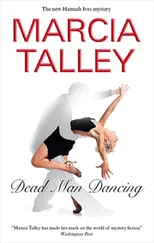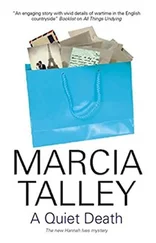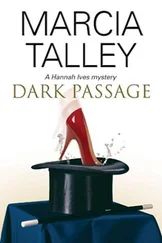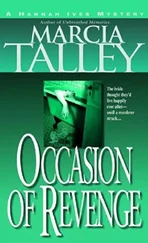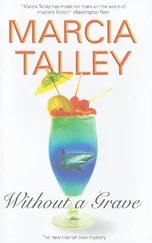“Former boss,” Cassandra corrected.
“I bailed her out,” Eva explained.
Normally, I trusted Eva’s judgment, but bailing out the woman who may have murdered her husband was a bit too forward-thinking, even for me.
Nevertheless, I invited them in.
It was a beautiful spring day, so I seated the women out on the patio, leaving them to commune with nature and make small talk while I brewed a fresh pot of coffee and wondered why they’d come to see me. While water gurgled through the Mr. Coffee machine, I hauled some sugar cookies out of the freezer and arranged them on a plate to thaw, thinking how appalled François Lesperance would be if he caught me doing it.
“What I don’t understand, Cassandra,” I said as I emerged from the kitchen with the coffeepot in one hand and three empty mugs in the other, “is what motive you had for killing Roger.” I raised a finger. “Hold that thought.”
I popped back into the kitchen for the cream, sugar, and cookies, then continued our conversation. “Seems to me that Roger had a much stronger motive to murder you , and not the other way around. You fired him, after all.”
Cassandra blushed to the tips of her multi-blond roots. “Apparently you’ve been missing the evening news for the past several days, Hannah.”
“I guess I have.”
“That was me, front and center, on one of Erika Rose’s picket lines. I was the blonde holding the sign that said, ‘The Only Good Pedophile Is a Dead Pedophile.’ ”
In spite of the seriousness of the situation, I grinned. “Do you actually believe that, or did you simply glom on to the first sign Erika handed you?”
“No, it was my sign, my sentiment. I truly believe that pedophilia is incurable, but I’m certainly not glad that Roger is dead.”
She sipped at her coffee. “Roger Haberman was a generous guy, and a hard worker. I never had any complaints- ever -that he was messing with the children at the sailing school. But after the news broke, I just had to let him go.”
“Roger managed to control one thing, it seems,” his widow muttered. “He was able to keep his addictions out of the workplace.”
“True,” Cassandra agreed.
“You’re probably wondering why we’re here today,” Eva continued, dramatically shifting gears.
“My reputation for excellent coffee?”
“That, too.” She’d been holding her coffee mug in both hands, but she set it down on the table. “We’re hoping that you can help, that by putting three heads together, rather than two, we can sort this thing out.”
I was wondering what thing they wanted sorted when Cassandra spoke, clearing up any confusion. “I didn’t kill Roger.”
“And I believe her,” Eva said. “The police are basing the case against Cassandra on the most circumstantial of evidence,” she continued. “The suicide note, which appears to have been written in her style, and her fingerprints on the bottle.”
“It’s circumstantial evidence like that that can do you in,” I commented, remembering my own sorry plight when the hammer that had been used to bash in Jennifer Goodall’s skull had turned up with my ridges and whorls all over the handle. “Was the Jim Beam bottle yours?”
“Oh, yes. I kept it in my desk drawer. For medicinal purposes.” She blushed again. “I know it sounds lame, but every once in a while I’d have one of those days, and it’d come in handy. It wasn’t the kids so much,” she explained, “but their parents can certainly drive you to drink.”
“Everyone knew where she kept the bottle,” Eva added.
“And the Prozac?” I wondered.
Cassandra shrugged. “There must be half a dozen people to-ing and fro-ing in our office every day, exhibiting every sort of phobia and anxiety you can imagine. Any one of them could have had access to Prozac.”
Thinking about the contents of my own daughter’s medicine cabinet, I had to agree. “If the police think you murdered Roger,” I continued with unrelenting logic, “they must believe that you faked his suicide note, too.”
“I haven’t seen it yet,” Cassandra complained. “It was on Roger’s computer.”
Eva smiled at Cassandra sympathetically. “They took his CPU, didn’t they? Looking for evidence? They’ve still got the PC Roger used at home.”
Cassandra nodded.
Eva frowned. “Then that’s it, then.”
I raised a cautionary finger. “But wait! Cassandra, all your files are backed up every night to the mainframe computer, right?”
Cassandra nodded, comprehension dawning. “We should be able to find a copy of Roger’s note if we restore it from backup!”
I shoved my coffee mug aside. “Brilliant! Well, what are we waiting for?”
Eva drove the three of us to the Eastport Yacht Sales offices near the intersection of Second and Severn in Eastport. We parked next to the sailmaker’s shop.
It was still early, so the office was locked, but Cassandra let us in with her key.
The reception area of EYS looked like a photo layout for Yachting magazine. Comfortably upholstered chairs were arranged in a neat square around a glass-topped table, where back issues of Yachting, Sail , and Cruising World were arranged in neat cascades.
Roger’s office, too, seemed ready for the photographers. Except for the dust bunnies marking the empty spot under his desk where Roger’s CPU had so recently sat, the room was immaculate. The police had done a careful job, it seemed. Nothing appeared to have been disturbed-the papers in his outbox, his telephone, his monitor, his keyboard, mouse, and mouse pad. A customized mouse pad, I noticed with a twinge, with a picture of Roger and Eva smiling out from it, standing on the rim of the Grand Canyon.
Because Roger’s access to the mainframe had disappeared along with his hard drive, Cassandra escorted us to her office, stopping along the way to turn the printer on in the photocopying room and to remove a laptop from a locked cabinet.
The state of Cassandra’s office would have sent Mr. Monk, the obsessive-compulsive TV detective, into cardiac arrest. The rampant disorder made even me catch my breath. Catalogs, brochures, and business papers of all kinds littered every available surface. Sailing posters hung crookedly on the walls. The cord on the venetian blinds was a tangled mess, three slats in it were broken, and a sticky puddle marked the spot where coffee had recently spilled on Cassandra’s desk. Either the Annapolis police had different searching standards from the FBI, or Cassandra was, quite simply, a slob.
“Sorry for the mess,” she apologized, confirming my slob theory.
With a broad sweep of her arm she reclaimed the work space, sending a stack of papers cascading onto the floor. She set the laptop down and plugged in the ISDN cable that snaked out of the wall. “They took my CPU for evidence, too,” she explained. “But they didn’t think about the company laptop. We use it mostly for boat shows.”
I watched as Cassandra powered up the laptop and prepared to access the centralized office files. She tapped away with confidence, while Eva and I looked over her shoulder, bristling with nervous tension.
“Files, backup, restore,” Cassandra was saying. The light on the front of the laptop blinked, and the hard drive whirred. “Word, file, open…” Tap tap tap . “Print!” she exclaimed at last, stabbing at the Enter key with a flourish.
“Wait here while I get the file,” she said.
Cassandra returned a few minutes later with three copies of Roger Haberman’s so-called suicide note.
It has come to my attention that people are conspiring against me. They will never rest until I am dead. I didn’t mean to harm anyone. For the trouble I’ve caused, I’m desparately sorry. I’m a mess. I’m out of control. I see no other way than to quickly end it.
Читать дальше

